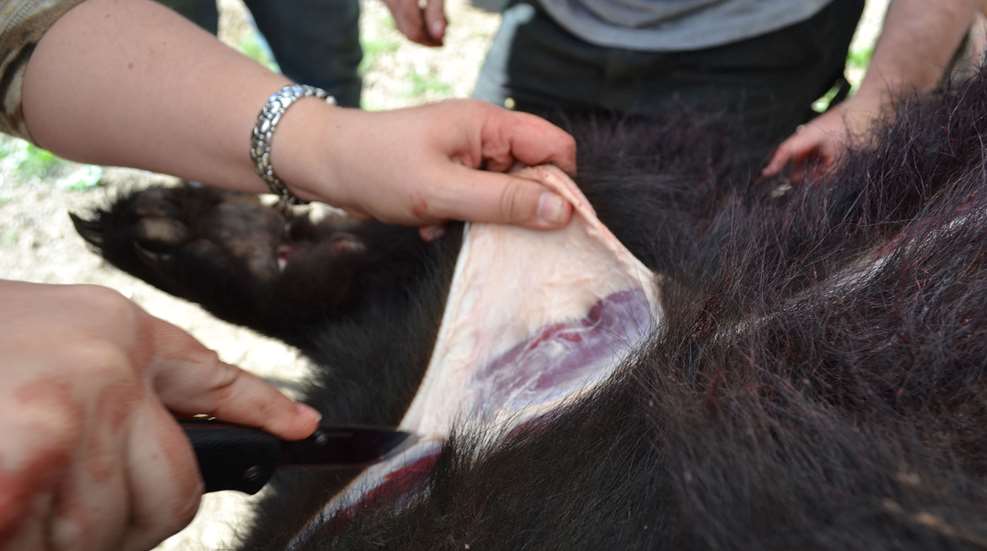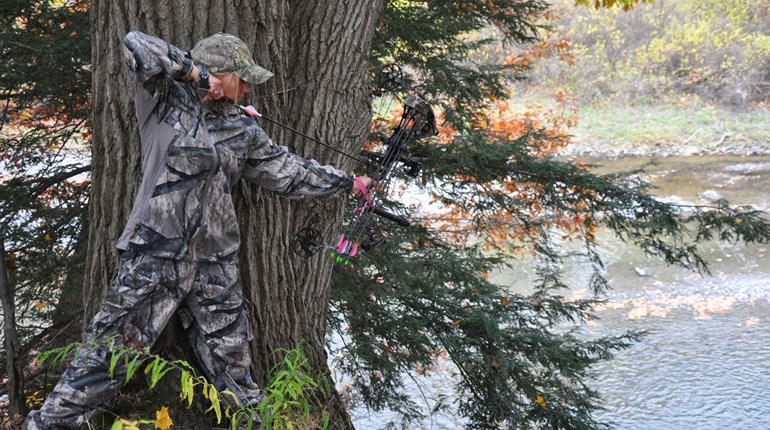
When it comes to game meat, some animals just taste better than other animals, even among the same species. The animal’s age, diet and how they died all play a role in how their meat will taste, but only to a certain extent. If you’ve ever had truly bad game meat, it’s likely because it was cooked improperly (usually overcooked) or because the animal wasn’t handled well in the field. How do you make sure you don’t screw up the field care so your game meat tastes as good as it can?
This boils down to two major rules:
- Cool It Off Quickly
- Keep It Clean
Cool It Off
I don’t care how cold it is outside—you have to get an animal cooled off asap. A big-game animal is literally wearing a fur coat designed to keep it warm in cold weather, and bacteria grows in warm environments. As soon as an animal expires, bacteria starts growing and multiplying, and the faster you can cool the whole thing down, the sooner you stop that bacteria growth. This goes double in warm weather. So what are the tricks to cooling it off quickly?

Handle it asap: I know you want to take pictures with your elk or drive your deer into town to have lunch and show your buddies. But the clock is ticking on that bacterial growth, and the longer you wait to get those guts out, the warmer everything will get and the longer it has to fester in its own juices. Gut a big game animal as soon as you’re able, unless you’re doing the gutless method, in which case you’ve got to debone it and refrigerate the meat very shortly after the animal expires.
Use cooling tricks: If you have shade available, field-dressing out of the direct path of the sun will help, especially in warm weather. Hanging the carcass helps, too, by increasing air circulation around it—it also lets gravity assist with removing the organs. Once it’s gutted, you can prop the carcass open with a stick to let the body heat dissipate, and pack the cavity with bags of ice if possible unless you’ll be getting it straight to the fridge or a cooler.
Hang it or skin it: I don’t age my venison because I seldom have the time (I’m often traveling when I hunt), but many hunters swear by it. If you’re going to hang and age the carcass, be sure the temperatures stay in a safe zone. If you’re not going to age the carcass, get the skin off as soon as you’re able to do so in a clean environment. Then you can let the gutted, skinned carcass hang while you have lunch or take a break. Leaving the skin on acts as insulation that holds in a lot of heat, and as we’ve learned, nothing good comes from that.
What about birds and small game? For me, ducks, geese and upland birds go in the fridge whole, feathers and guts and all, for a few hours or a day until I have time to butcher them. The smaller they are, the less they hold heat. If you know you can’t get them cooled off as quickly as you’d like, you can consider gutting them. Some hunters like to age their ducks by hanging them by the head in the fridge, with the guts still in them, for days or until the head falls off. Whichever way you go, the point is, they’ve been cooled quickly.
For turkeys, it’s easier to dress them while they’re still warm, but I generally filet the breast meat off and cut off the legs, so I don’t fool with the guts at all. I try to do this within a couple hours of killing the bird, but if for some reason I couldn’t, I’d want to get the whole bird in the fridge or a cooler.
The “cool it quickly” rule applies to small game, too, and things like squirrels and rabbits are easier to clean when they’re still warm. And it’s a fast job anyway, so get the skin off and the guts out soon after shooting and then you can throw the bone-in meat in the fridge until you want to deal with it.
Keep It Clean (and Dry)
There are plenty of ways you can contaminate the meat, leading to foul-tasting meat and especially venison. You’ll have some bloodshot meat, and once in a while you might find yourself field-dressing an animal that’s been gutshot. You can’t do much about that other than try to minimize the damage, so don’t stress about it.
Use clean, sharp tools: Using the right tools—a sharp knife in particular—will give you more control and help you avoid cutting things you don’t want to puncture. Keep your tools clean, and clean or at least wipe them frequently during the process.

Avoid nicking the nasty stuff: As much as you can, try not to nick the stomach or the bladder, and keep your knife away from the scent glands on the back legs. Anything nasty that gets on the knife will get transferred to the meat and can impart a less-than-desirable flavor. Those scent glands are particularly pungent, and if your knife comes in contact with one of them, you should wash it thoroughly with soap before touching the meat with it again.

Minimize hair transfer: If you do most of your cutting with the knife blade up, facing you, you’ll minimize the amount of hair that gets on your knife and gets transferred to the meat. Meat covered in hair will have to be rinsed, and we want to avoid rinsing meat if we can. Speaking of…
Keep it dry: You should rinse out the cavity after you’ve gutted the animal, but only if you have access to clean water or even snow. Water from a mountain stream could be contaminated with who-knows-what bacteria, so don’t take chances with it. If you’ve gotten urine, fecal matter or stomach juice on any of the meat itself, rinse it off, but otherwise, don’t get the meat wet for no reason. Moisture breeds bacteria.
If you’ll be putting the meat in a cooler, whether for transport or wet-aging, protect it in a plastic bag so that it doesn’t end up submerged in water (even ice water). That just leads to gray, sad, waterlogged venison with reduced flavor.
Protect the meat: If meat is to be exposed to air for a while, like if you’re packing it out on your back or you’re hanging it outdoors without the skin, it’s a good idea to protect it from insects, dirt and other potential contaminants. You can use cheesecloth or game bags for this purpose, or even coat the outside of the meat with black pepper.
The flavor of your game meat isn’t 100 percent within your control, but the good news is that proper field care really makes a huge difference in ensuring your venison, waterfowl or other game meat tastes the best it can. If you cool the animal as quickly as possible and take care to keep the meat clean and free of contamination, you’ll be rewarded with the best possible flavor for your wild game meals.














































